Engineering students awarded Fulbright Scholarships
Six students and alumni from the College of Engineering will research and study abroad on Fulbright program scholarships.
Six students and alumni from the College of Engineering have been awarded grants by the Fulbright U.S. Student Program to research and study in universities and institutes across the world.
The Fulbright was founded in 1946 in order to provide students and young professionals the opportunity to work and study abroad, facilitating cultural exchange. Since then, more than 100 Tartans have received a Fulbright scholarship.
The process begins with informational sessions in the spring, along with application workshops in the summer, autumn, and winter. Recipients are announced in the spring.
Kristin Daniel
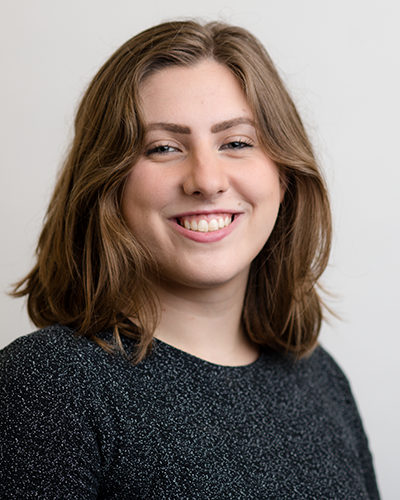
Growing up in Detroit, Kristin Daniel was inspired by the water crisis in nearby Flint, Michigan to work in health research, driven to improve equitable access to health care. “I decided to become a biomedical engineer to use my inclination toward health research to help people,” she says. “I want to make it so that a baby does not have a worse chance of surviving because they grew up 30 minutes north.”
She was led by this ambition to study chemical engineering and biomedical engineering at CMU, and she graduated with her degree in 2023. While at CMU, she joined the Macrophage Therapeutics Lab, led by principal investigator Elizabeth Wayne.
Daniel has established a connection between the Macrophage Therapeutics Lab and researchers in Birmingham, in the United Kingdom. She will travel there with her Fulbright to study preeclampsia, a reproductive disease that can occur during pregnancy. Not much is currently known about preeclampsia due to inequities in reproductive health research, so during her Fulbright, Daniel hopes to “gain a perspective on social determinants of health and other economic impacts that affect preeclampsia.” Infant and maternal mortality is lower in the United Kingdom than in the United States, and Daniel wants to research possible reasons for that disparity.
When she has finished her work in Birmingham, Daniel hopes that the experience will help her achieve a Ph.D. and run her own research laboratory.
“I am enthused by the possibility of global collaboration on these issues,” she says.
Ian Gimino
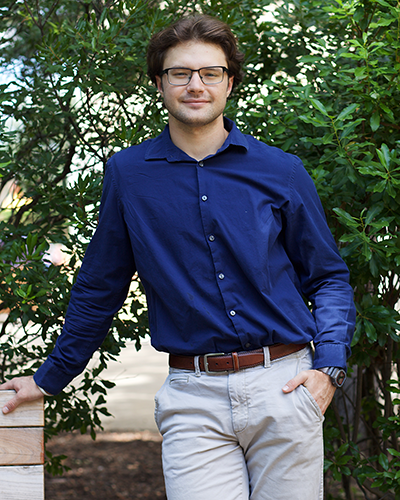
Ian Gimino, who graduated this year with a degree in chemical engineering, has been selected to research immunotherapy treatment devices in Munich, Germany.
He will study at the Technical University of Munich, working with the translational cancer research center TranslaTUM and the university hospital Klinikum Rechts der Isar. There, he will work on devices that can produce nanovesicles, or small organic structures that deliver drugs to cells. In particular, he hopes to improve immunotherapy treatments for head and neck cancers, which are difficult to treat with current methods.
Ian is interested in applying engineering principles to medical questions, so the focus of the lab he will be joining along with the strong German culture of Bavaria made Munich “easy to choose” during his Fulbright application.
He was “elated” to be selected for the award. He credits his CMU experience for giving him crucial problem-solving skills, and he thanks the supportive community of faculty and staff who helped him search for the right location and project. “The scholarship will provide invaluable insights for understanding the difference between US and German healthcare systems along with being in an environment with extreme engineering expertise,” he says.
Ben Therrien
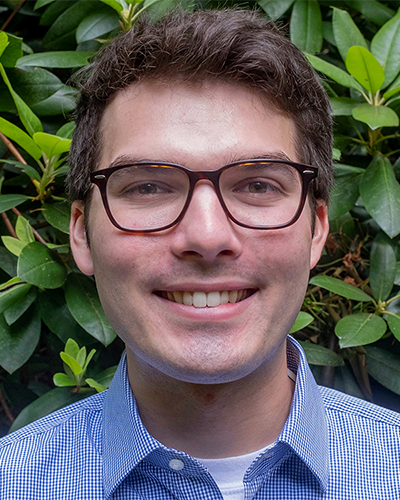
Ben Therrien, a current Ph.D. candidate pursuing a joint degree in civil and environmental engineering and in engineering and public policy, will be traveling across the European Union on his Fulbright award.
There, he will be completing his dissertation, in which he seeks to understand agricultural nanotechnology through two main perspectives: through understanding how the technology is developed, and through investigating how risks and policies associated with the new technology are communicated. In particular, he will be working on the last chapter of his dissertation, in which he will speak with stakeholders across Europe to see how his communication strategy performs and what risks the stakeholders are sensitive to. He will compare these communication sensitivities to those of US stakeholders, because, he says, “Developing a unified communication and policy framework for new technologies, like nanotechnology, can help support our mutual food security goals into the future.”
This work will lead him to travel around the EU, working with researchers from primarily three universities: the Swedish University of Agricultural Sciences in Sweden, Ludwig Maximilian Institute of Munich in Germany, and Łódź University of Technology in Poland. Germany and Poland have prominent agricultural sectors, and Sweden has a history of risk communication work in agricultural and food sciences.
Therrien was inspired to apply for the Fulbright because of his experience as a joint-degree student, which has taught him to appreciate how technology is developed along with the roles of risk communication and policies regarding that technology. “I think that informing the public about science and technology is an important part of engineering,” he says. “My Fulbright project leverages my technical understanding of nanotechnology and allows me to put my behavioral and decision science training into practice as I work towards my science communication goals.”
He thanks his CMU community for the support that led to the award. “Being a Fulbright Schuman Scholar is an incredible honor,” he says. “I owe a huge debt of gratitude to my advisors in EPP and CEE for supporting my research goals, to CMU’s Office of Research and Scholar Development for helping me throughout the application process, and to my peers who inspire me to take on new challenges!”
Zeynep Ozkaya
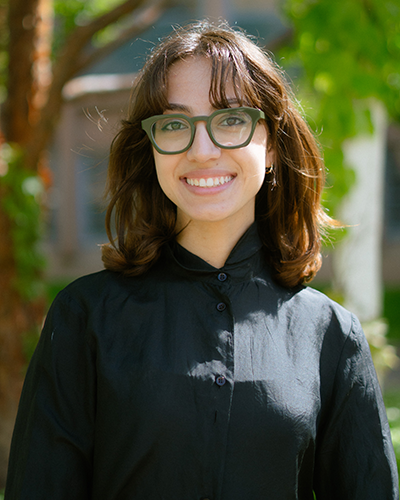
Zeynep Ozkaya, who graduated this year with a degree in electrical and computer engineering, will be traveling to the Max Planck Institute for Intelligent Systems in Stuttgart, Germany to study deep brain stimulation.
Ozkaya has a strong interest in neuroscience and how it intersects with electrical engineering. “I want to work within a field that allows me to make a strong impact on both scientific discovery and patient lives,” she says. While at CMU, she worked as a research assistant for the labs of both Jana Kainerstorfer and Marlene Behrmann, and these research experiences have prepared her for the intensive research she will do in Stuttgart.
The Fulbright will not be her first time studying in Stuttgart; she researched at the Max Planck Institute for Intelligent Systems last summer through the International Summer Undergraduate Research Fellowship. That experience is why she applied for a Fulbright in Germany, in order to continue the research project she began then. She will be researching deep brain stimulation with magnetic nanoparticles in order to help people suffering from diseases such as epilepsy or Parkinson’s.
When medication does not work or if it causes negative side effects, physicians often try to treat these patients with deep brain stimulation. However, this treatment requires an invasive surgery for a deep brain implant. “Through working on less invasive DBS mechanisms [such as magnetic nanoparticles], I hope to contribute to the body of work that could revolutionize non-drug-dependent treatment for neurodegenerative disorders,” she says. She hopes to use her research to learn more about deep brain stimulation and develop better treatments for patients with neurodegenerative disorders.
“The Fulbright Scholarship is a great opportunity for me to further explore my research interests while experiencing a different culture,” she says. “An exchange of different ideas and perspectives is crucial to scientific advancement, and this scholarship will enable me to contribute to an exchange of knowledge between different cultures and foster collaboration.”
Shaun Ranadé
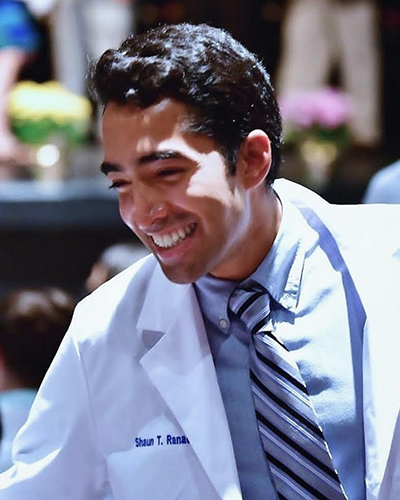
Shaun Ranadé, an alumnus of three CMU colleges, will be headed to Nepal for his Fulbright project. He graduated in 2016 with a master’s degree in biomedical engineering, and before that, he earned two bachelor’s degrees: one in biological sciences and the other in Japanese studies. He is currently a third-year medical student in New York.
In Nepal, he will treat gestational diabetes by implementing continuous glucose monitoring. Nepal has a 20% higher rate of gestational diabetes than neighboring countries, and the government has prioritized treating it, which made it an ideal place for him to implement telemonitoring to improve the health of mothers and infants. In addition, he has local connections to the area, so he looks forward to seeing its natural beauty and participating in cultural and religious festivals.
Gestational diabetes is a personal issue for Ranadé, since it has affected the lives of many people he knows. “I am motivated by the potential to level the playing field and give children a healthy start in life.”
He was very involved in the CMU community during his time as a student: beyond his three degrees, he also co-founded CMU’s chapter of Global Public Health Brigades. He believes “medical knowledge, cultural competence, and compassion are essential for effective physicians,” and this ethos has informed his degree choices and other activities, including this Fulbright. He says his interdisciplinary CMU experience across three colleges prepared him for his work, which has not just included medical school, but also in fields such as biotechnology investment consulting, biotechnology intellectual property law, and in cellular therapeutics research and development. “The supportive environment and rigorous curriculum have equipped me with the skills and confidence to engage with key opinion leaders, subject matter experts, and practicing physicians,” he says.
In addition to this year’s Fulbright, he has also been awarded an NIH Fogarty Fellowship in Public Health and the Northern Pacific Global Health Fellowship. “Receiving the Fulbright Scholarship is a recognition of my continued commitment to serving others through healthcare and as a future physician,” he says. “The Fulbright experience and its alumni network are helping me become a public health leader, demonstrating that health concerns are universal and that current standards of care should be accessible to all including rural settings.”
Katie Hart
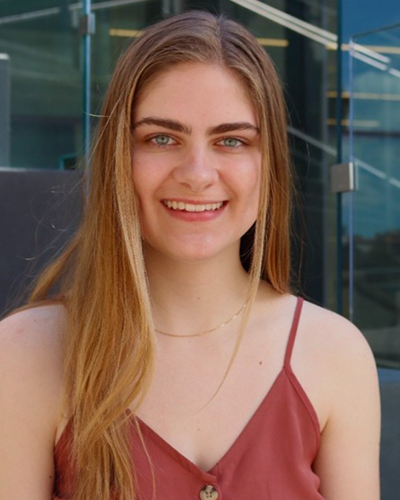
Katie Hart has just graduated with her bachelor’s degree in civil and environmental engineering with an additional major in engineering and public policy. She will use her Fulbright to study for her master’s degree at the Ostbayrische Technische Hochschule Amberg-Weiden in Amberg, Germany.
There, she will continue learning about environmental engineering and public policy, with a special focus on clean energy. She is interested in Germany’s energy policy and how they have been transitioning towards more renewable sources of energy. They have had an interesting transition, she says, as they have had to produce more coal to make up for energy lost as nuclear power plants are decommissioned, and Hart wants to know what the United States can understand from this experience. She wants to collaborate with energy policy experts across the world to learn how the world can transition to clean energy at the international level in order to mitigate climate change.
Her education at CMU prepared her for this experience. Her interest in clean energy was sparked by a research experience she had in the Department of Civil and Environmental Engineering, and further developed by classes she took in that department. She also studied abroad in Rome last spring: “It was an amazing experience that gave me a taste of living and learning in a new country,” she says.
This is also not her first award, as earlier this year, she was honored with the George Washington Award, recognizing her academic excellence and leadership.
“I think many CMU students would understand the experience of holding themselves to high academic and professional standards, and we might not always stop and take the time to feel proud of what we’ve accomplished, whether it reaches our standards or not,” Hart says. “Receiving the Fulbright is a reminder to me to take time and celebrate my time in college and what I have done, as well as thank my mentors, professors, family, and friends who had such an impact on my time here.”
